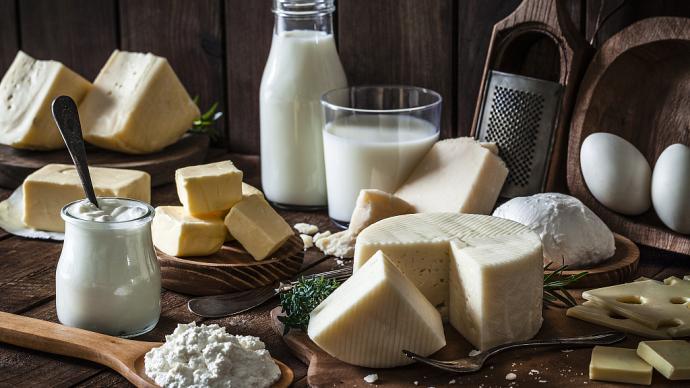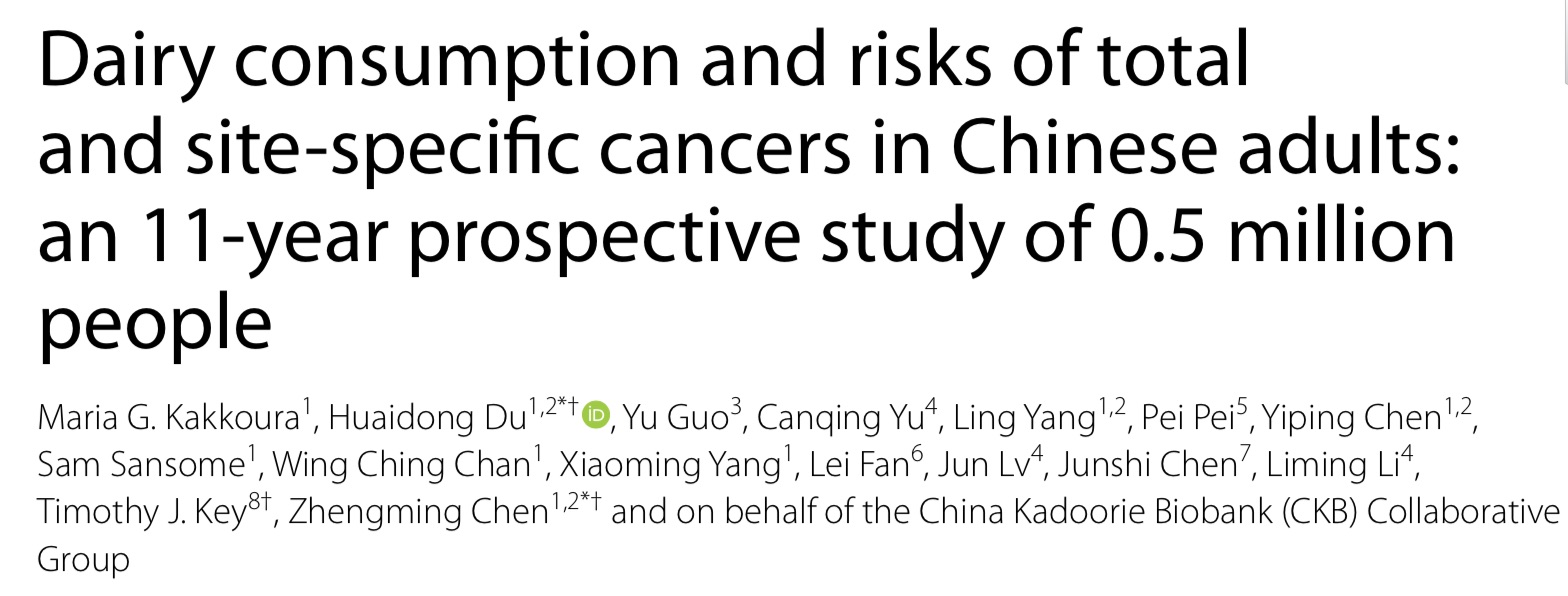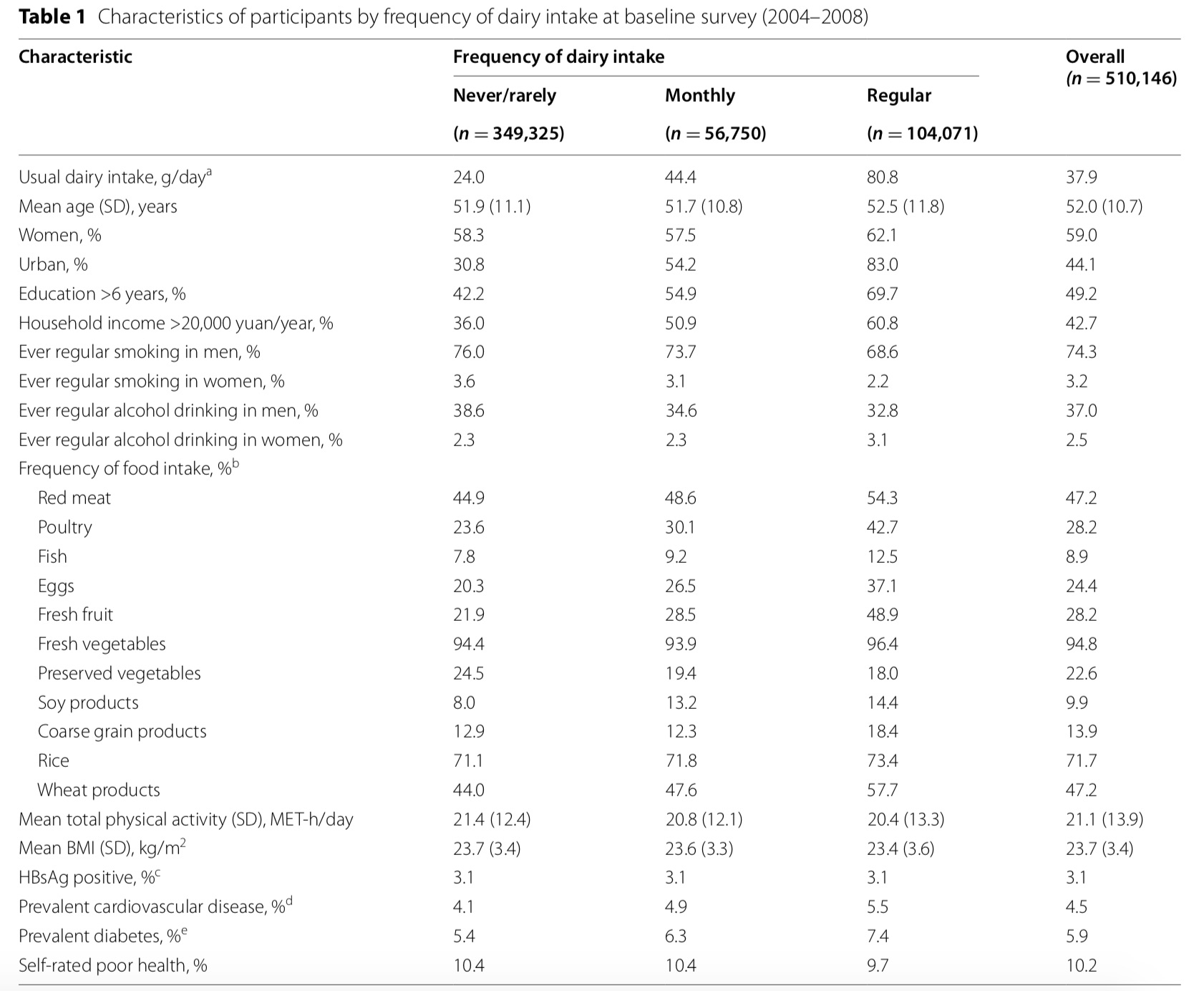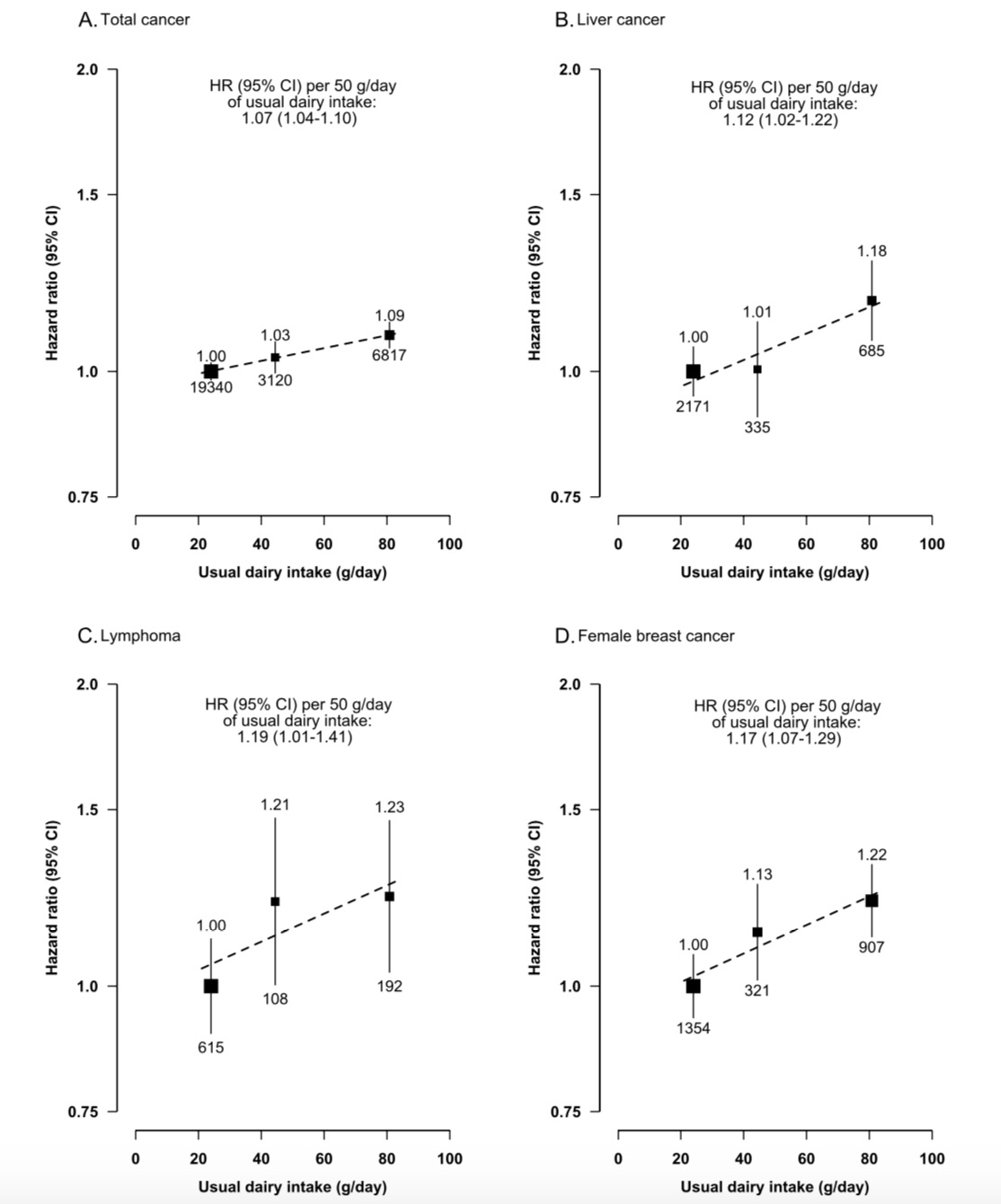
In 2020, there will be 9.96 million deaths from cancer worldwide. The World Health Organization's International Agency for Research on Cancer (IARC) previously reported that 1 in 5 people in the world will develop cancer in their lifetime, 1 in 8 men and 1 in 11 women. died of this disease.
In China, there are 4 million new cancer cases and 3 million cancer deaths every year, of which lung cancer, colorectal cancer, stomach cancer, liver cancer and female breast cancer are the most common cancers. Among the major risk factors for cancer, some potential dietary factors have long been explored, including low intakes of fresh fruits, vegetables, and whole grains, and high intakes of processed meats.
What is the relationship between dairy intake and cancer risk? The World Cancer Research Fund/American Institute for Cancer Research (WCRF/AICR) is currently presenting the conclusion that to date, although the overall evidence on the relationship between dairy and cancer remains inconsistent, there is evidence to support a possible effect of dairy on colorectal cancer. protection; and there is some evidence that high dairy intake may be associated with an increased risk of prostate cancer.
"Recent research results in the United States and Sweden suggest that dairy products may be associated with breast cancer and liver cancer." Yu Canqing, associate professor of the Department of Epidemiology and Biostatistics, School of Public Health, Peking University, told The Paper (www.thepaper.cn) Said so in the interview. A recent study published in the open-access journal BMC Medicine with an average follow-up of nearly 11 years showed that higher dairy intake was associated with higher rates of liver cancer and female breast cancer among Chinese adults. risk related. The study was jointly completed by research teams from the University of Oxford, the Chinese Academy of Medical Sciences and Peking University. The data came from the China Chronic Disease Prospective Research Project. The sample size involved 510,146 Chinese adults with an average follow-up time of 10.8 years.
A recent study published in the open-access journal BMC Medicine with an average follow-up of nearly 11 years showed that higher dairy intake was associated with higher rates of liver cancer and female breast cancer among Chinese adults. risk related. The study was jointly completed by research teams from the University of Oxford, the Chinese Academy of Medical Sciences and Peking University. The data came from the China Chronic Disease Prospective Research Project. The sample size involved 510,146 Chinese adults with an average follow-up time of 10.8 years.
This is the first and largest study to date on the relationship between dairy intake and cancer risk based on the Chinese population.
It should be reminded that Yu Canqing said that the current overall evidence on whether dairy consumption affects cancer risk is inconsistent globally, and more research is needed to confirm, "At present, it is not possible to guide residents' dietary behavior through a single study."
Data of over 500,000 Chinese adults, from 10 different regions
The paper notes that few prospective studies have been conducted in populations from non-Western countries that are comparable to Western populations in terms of cancer incidence, type and average intake of dairy products, and genetic factors in the ability to metabolize dairy products. difference is huge.
Yu Canqing also mentioned that the dietary structure of the West is very different from that of China. "The consumption of dairy products in China is much lower than that in Europe and North America, and the types of dairy products that people usually eat are also different. Domestically, milk and yogurt are the main products, and foreign cheeses are the mainstays. A lot of butter and butter, which may have something to do with the results of Eastern and Western studies. For example, a study based on American and Canadian women published in the World Journal of Epidemiology last year found that high milk intake was significantly associated with an increased risk of breast cancer. There was no significant association between yogurt and cheese consumption and breast cancer risk."
It is worth noting that although China's per capita milk consumption has increased in recent decades, it is still well below Europe's. The paper cited a set of data from 2013, in which China's per capita milk consumption was 32.7 kg/year, while that in Europe was 215.1 kg/year. In addition, most Chinese people are lactose intolerant, that is, they cannot produce enough lactase to break down and digest the lactose in milk, so they cannot metabolize dairy products well.
The sample data of the study came from the China Chronic Diseases Prospective Study Project (CKB). Yu Canqing introduced that CKB is an international cooperative research project on chronic diseases jointly carried out by Peking University, Chinese Academy of Medical Sciences and Oxford University. The project aims to conduct in-depth research on the main causative factors and protective effects of various major chronic diseases that endanger the health of the Chinese population through the establishment of a Chinese healthy population cohort and a basic health database based on blood samples from multiple levels such as genetics, environment and lifestyle. Factors, pathogenesis, and epidemic laws and trends, in order to effectively formulate strategies and measures for the prevention and control of chronic diseases in my country, and develop new treatment and intervention methods, providing scientific evidence for the Chinese population.
The project introduction pointed out that long-term cryopreservation of biological samples collected during the baseline survey and repeated surveys will be used for clinical biochemical, genomics, metabolomics and epigenetics research.
Yu Canqing said that the CKB project is a large-scale prospective cohort study, which recruited 500,000 adult research subjects from 10 regions across the country, followed up for more than ten years, and the quality of the data is very high. "In terms of analytical methods, the standard cohort study analysis method used is still very suitable."
Among the more than 510,000 people included in the study, 20.4% regularly consume dairy products (at least once a week), 68.5% never or rarely consume dairy products, and the average dairy consumption of the population is 37.9 grams per day, The average consumption of regular eaters was 80.8 grams per day.
During an average follow-up period of 10.8 years, the study recorded 29,277 cancer cases between the ages of 35 and 79. Lung cancer has the highest incidence in the general population, followed by female breast, gastric, colorectal, and liver cancer.
It is suggested that dairy product intake is positively associated with total cancer risk, but more research is needed to confirm
The data included age, region, education level, household income, smoking, alcohol consumption, physical activity, family history of cancer, body mass index (BMI), soy and fresh fruit intake, and chronic hepatitis B virus infection (for liver cancer). After adjusting for a series of factors that could lead to confounding effects, the team found that dairy intake was significantly and positively associated with overall cancer risk: those who regularly consumed dairy products had a 9% higher overall risk of cancer and an 18% higher risk of liver cancer and a 22% increased risk of breast cancer in women. For every 50 grams of dairy products consumed per day, the risk of overall cancer, liver cancer and breast cancer in women increased by 7%, 12% and 17%, respectively.
The team also found that those who regularly consumed dairy products had a 23 percent higher risk of developing lymphoma, but this association lost statistical significance after adjustment for multiple testing.
Previously, the evidence linking dairy products to liver cancer was fairly limited and inconsistent. A recent meta-analysis of four prospective studies (1261 patients) from the United States and Europe showed that those with the highest intake of dairy products had a significantly higher risk of liver cancer by approximately 30% compared with the lowest intake of dairy products. The research team believes that their analysis of 3,191 cases in this study from a Chinese population adds important new evidence linking dairy consumption with liver cancer risk independently of hepatitis B infection.
For breast cancer, the most common cancer type in women worldwide, according to WCRF/AICR, the main risk factors for postmenopausal breast cancer include reproductive and hormonal factors, low physical activity, alcohol consumption and obesity. However, overall evidence on the association between dairy intake and premenopausal and postmenopausal breast cancer is limited.
Citing a recent prospective study of 53,000 North American women, the research team found that dairy intake was positively associated with overall breast cancer risk, with a hazard ratio of 1.22 in the highest dairy intake group compared with the lowest group. This is basically consistent with the results of the research team.
Importantly, the majority of this cohort of 53,000 North American women were vegetarians and vegans and had a much lower average dairy consumption compared to the general Western population, similar to Chinese women. Therefore, the research team notes that this may also be the only study to compare with their results.
In addition, the study did not find a significant association between dairy intake and the risk of colorectal, prostate or other types of cancer.
The study concludes by cautioning that the study has several limitations, including that the number of cancer cases may not be large enough to allow reliable statistical analysis of some less common cancer types, such as lymphoma and prostate cancer. In addition, the study was an observational study rather than a randomized controlled trial, so the observed association cannot be used to establish a causal relationship between dairy intake and cancer risk. Further research is needed in the future to explore causality and the underlying underlying mechanisms.
It is worth noting that Yu Canqing said that this study only suggested that dairy intake is related to cancer risk through analysis, but the current overall evidence on whether dairy consumption affects cancer risk is inconsistent globally, "More needs to be done." Multiple studies confirm that, at present, it is not possible to guide the dietary behavior of residents through a single study."
He also emphasized that there is clear evidence that dairy products provide rich protein, vitamins and minerals, which are also very important to human health. For example, the paper also mentioned that respondents with high intake of dairy products had lower BMI and less height loss with age, suggesting that dairy intake may be helpful for weight control and bone health. .
In China, there are 4 million new cancer cases and 3 million cancer deaths every year, of which lung cancer, colorectal cancer, stomach cancer, liver cancer and female breast cancer are the most common cancers. Among the major risk factors for cancer, some potential dietary factors have long been explored, including low intakes of fresh fruits, vegetables, and whole grains, and high intakes of processed meats.
What is the relationship between dairy intake and cancer risk? The World Cancer Research Fund/American Institute for Cancer Research (WCRF/AICR) is currently presenting the conclusion that to date, although the overall evidence on the relationship between dairy and cancer remains inconsistent, there is evidence to support a possible effect of dairy on colorectal cancer. protection; and there is some evidence that high dairy intake may be associated with an increased risk of prostate cancer.
"Recent research results in the United States and Sweden suggest that dairy products may be associated with breast cancer and liver cancer." Yu Canqing, associate professor of the Department of Epidemiology and Biostatistics, School of Public Health, Peking University, told The Paper (www.thepaper.cn) Said so in the interview.
 A recent study published in the open-access journal BMC Medicine with an average follow-up of nearly 11 years showed that higher dairy intake was associated with higher rates of liver cancer and female breast cancer among Chinese adults. risk related. The study was jointly completed by research teams from the University of Oxford, the Chinese Academy of Medical Sciences and Peking University. The data came from the China Chronic Disease Prospective Research Project. The sample size involved 510,146 Chinese adults with an average follow-up time of 10.8 years.
A recent study published in the open-access journal BMC Medicine with an average follow-up of nearly 11 years showed that higher dairy intake was associated with higher rates of liver cancer and female breast cancer among Chinese adults. risk related. The study was jointly completed by research teams from the University of Oxford, the Chinese Academy of Medical Sciences and Peking University. The data came from the China Chronic Disease Prospective Research Project. The sample size involved 510,146 Chinese adults with an average follow-up time of 10.8 years.This is the first and largest study to date on the relationship between dairy intake and cancer risk based on the Chinese population.
It should be reminded that Yu Canqing said that the current overall evidence on whether dairy consumption affects cancer risk is inconsistent globally, and more research is needed to confirm, "At present, it is not possible to guide residents' dietary behavior through a single study."
Data of over 500,000 Chinese adults, from 10 different regions
The paper notes that few prospective studies have been conducted in populations from non-Western countries that are comparable to Western populations in terms of cancer incidence, type and average intake of dairy products, and genetic factors in the ability to metabolize dairy products. difference is huge.
Yu Canqing also mentioned that the dietary structure of the West is very different from that of China. "The consumption of dairy products in China is much lower than that in Europe and North America, and the types of dairy products that people usually eat are also different. Domestically, milk and yogurt are the main products, and foreign cheeses are the mainstays. A lot of butter and butter, which may have something to do with the results of Eastern and Western studies. For example, a study based on American and Canadian women published in the World Journal of Epidemiology last year found that high milk intake was significantly associated with an increased risk of breast cancer. There was no significant association between yogurt and cheese consumption and breast cancer risk."
It is worth noting that although China's per capita milk consumption has increased in recent decades, it is still well below Europe's. The paper cited a set of data from 2013, in which China's per capita milk consumption was 32.7 kg/year, while that in Europe was 215.1 kg/year. In addition, most Chinese people are lactose intolerant, that is, they cannot produce enough lactase to break down and digest the lactose in milk, so they cannot metabolize dairy products well.
The sample data of the study came from the China Chronic Diseases Prospective Study Project (CKB). Yu Canqing introduced that CKB is an international cooperative research project on chronic diseases jointly carried out by Peking University, Chinese Academy of Medical Sciences and Oxford University. The project aims to conduct in-depth research on the main causative factors and protective effects of various major chronic diseases that endanger the health of the Chinese population through the establishment of a Chinese healthy population cohort and a basic health database based on blood samples from multiple levels such as genetics, environment and lifestyle. Factors, pathogenesis, and epidemic laws and trends, in order to effectively formulate strategies and measures for the prevention and control of chronic diseases in my country, and develop new treatment and intervention methods, providing scientific evidence for the Chinese population.
The project introduction pointed out that long-term cryopreservation of biological samples collected during the baseline survey and repeated surveys will be used for clinical biochemical, genomics, metabolomics and epigenetics research.

Characteristics of participants by dairy intake in the 2004-2008 baseline survey.
The baseline survey of the project was officially launched in June 2004. The research team recruited more than 510,000 adults from 10 different geographic regions in China. Most of the participants were Han Chinese (nearly 97 percent), 59 percent were women, and 44 percent lived in rural areas. The five urban areas include Shandong Qingdao, Heilongjiang Harbin, Hainan Haikou, Jiangsu Suzhou and Guangxi Liuzhou, while the five rural areas are located in Sichuan, Gansu, Henan, Zhejiang and Hunan. Volunteers were recruited between the ages of 30-79.Yu Canqing said that the CKB project is a large-scale prospective cohort study, which recruited 500,000 adult research subjects from 10 regions across the country, followed up for more than ten years, and the quality of the data is very high. "In terms of analytical methods, the standard cohort study analysis method used is still very suitable."
Among the more than 510,000 people included in the study, 20.4% regularly consume dairy products (at least once a week), 68.5% never or rarely consume dairy products, and the average dairy consumption of the population is 37.9 grams per day, The average consumption of regular eaters was 80.8 grams per day.
During an average follow-up period of 10.8 years, the study recorded 29,277 cancer cases between the ages of 35 and 79. Lung cancer has the highest incidence in the general population, followed by female breast, gastric, colorectal, and liver cancer.
It is suggested that dairy product intake is positively associated with total cancer risk, but more research is needed to confirm
The data included age, region, education level, household income, smoking, alcohol consumption, physical activity, family history of cancer, body mass index (BMI), soy and fresh fruit intake, and chronic hepatitis B virus infection (for liver cancer). After adjusting for a series of factors that could lead to confounding effects, the team found that dairy intake was significantly and positively associated with overall cancer risk: those who regularly consumed dairy products had a 9% higher overall risk of cancer and an 18% higher risk of liver cancer and a 22% increased risk of breast cancer in women. For every 50 grams of dairy products consumed per day, the risk of overall cancer, liver cancer and breast cancer in women increased by 7%, 12% and 17%, respectively.
The team also found that those who regularly consumed dairy products had a 23 percent higher risk of developing lymphoma, but this association lost statistical significance after adjustment for multiple testing.

Association of daily dairy product intake (g/day) with incidence of total cancer, liver cancer, lymphoma, and breast cancer in women.
During the discussion, the research team emphasized that liver cancer is one of the most common types of cancer in China, and more than half of the world's liver cancer cases and deaths are reported in China. This is mainly due to the high prevalence of hepatitis B infection and aflatoxins, as well as factors such as smoking and alcohol consumption.Previously, the evidence linking dairy products to liver cancer was fairly limited and inconsistent. A recent meta-analysis of four prospective studies (1261 patients) from the United States and Europe showed that those with the highest intake of dairy products had a significantly higher risk of liver cancer by approximately 30% compared with the lowest intake of dairy products. The research team believes that their analysis of 3,191 cases in this study from a Chinese population adds important new evidence linking dairy consumption with liver cancer risk independently of hepatitis B infection.
For breast cancer, the most common cancer type in women worldwide, according to WCRF/AICR, the main risk factors for postmenopausal breast cancer include reproductive and hormonal factors, low physical activity, alcohol consumption and obesity. However, overall evidence on the association between dairy intake and premenopausal and postmenopausal breast cancer is limited.
Citing a recent prospective study of 53,000 North American women, the research team found that dairy intake was positively associated with overall breast cancer risk, with a hazard ratio of 1.22 in the highest dairy intake group compared with the lowest group. This is basically consistent with the results of the research team.
Importantly, the majority of this cohort of 53,000 North American women were vegetarians and vegans and had a much lower average dairy consumption compared to the general Western population, similar to Chinese women. Therefore, the research team notes that this may also be the only study to compare with their results.
In addition, the study did not find a significant association between dairy intake and the risk of colorectal, prostate or other types of cancer.
The study concludes by cautioning that the study has several limitations, including that the number of cancer cases may not be large enough to allow reliable statistical analysis of some less common cancer types, such as lymphoma and prostate cancer. In addition, the study was an observational study rather than a randomized controlled trial, so the observed association cannot be used to establish a causal relationship between dairy intake and cancer risk. Further research is needed in the future to explore causality and the underlying underlying mechanisms.
It is worth noting that Yu Canqing said that this study only suggested that dairy intake is related to cancer risk through analysis, but the current overall evidence on whether dairy consumption affects cancer risk is inconsistent globally, "More needs to be done." Multiple studies confirm that, at present, it is not possible to guide the dietary behavior of residents through a single study."
He also emphasized that there is clear evidence that dairy products provide rich protein, vitamins and minerals, which are also very important to human health. For example, the paper also mentioned that respondents with high intake of dairy products had lower BMI and less height loss with age, suggesting that dairy intake may be helpful for weight control and bone health. .
Related Posts
0 Comments
Write A Comments